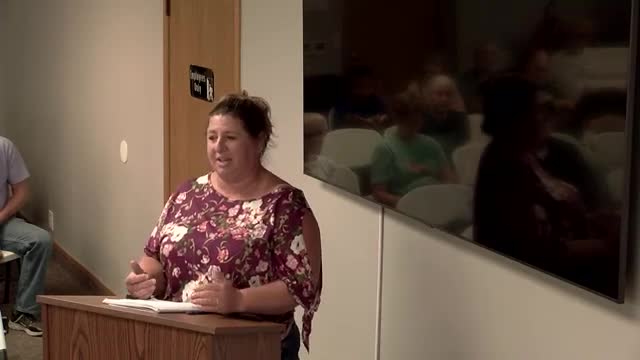Farmers Rally Against Commercial Solar to Protect Water Resources
July 30, 2024 | Reno County, Kansas
This article was created by AI summarizing key points discussed. AI makes mistakes, so for full details and context, please refer to the video of the full meeting. Please report any errors so we can fix them. Report an error »

During a recent government meeting, local stakeholders expressed strong opposition to the establishment of commercial-scale solar farms in the watershed district, citing concerns over environmental impacts and the preservation of agricultural land.
One speaker emphasized the economic benefits of existing residential properties that contribute tax revenue, questioning the rationale behind potentially jeopardizing this income for solar projects. The speaker raised alarms about the unknown long-term effects of solar installations on water quality, particularly in light of efforts by Wichita to protect its watershed.
Another participant, a long-time agricultural producer, echoed these sentiments, highlighting the risks of sedimentation into nearby reservoirs that supply water to the greater Wichita area. He described his experiences with water runoff on his property and the potential implications for irrigation practices, urging the committee to consider the long-term consequences of solar development on vital water resources.
The discussion also included suggestions for alternative solar panel placements, such as on existing buildings rather than on productive farmland. The speaker argued that utilizing disturbed land would be a more sensible approach, preserving valuable agricultural ground for future generations.
Overall, the meeting underscored a growing concern among local producers and residents about the balance between renewable energy initiatives and the protection of essential agricultural and water resources. The call for a prohibition on commercial solar projects in the watershed district reflects a broader apprehension about the sustainability of local farming practices and environmental stewardship.
One speaker emphasized the economic benefits of existing residential properties that contribute tax revenue, questioning the rationale behind potentially jeopardizing this income for solar projects. The speaker raised alarms about the unknown long-term effects of solar installations on water quality, particularly in light of efforts by Wichita to protect its watershed.
Another participant, a long-time agricultural producer, echoed these sentiments, highlighting the risks of sedimentation into nearby reservoirs that supply water to the greater Wichita area. He described his experiences with water runoff on his property and the potential implications for irrigation practices, urging the committee to consider the long-term consequences of solar development on vital water resources.
The discussion also included suggestions for alternative solar panel placements, such as on existing buildings rather than on productive farmland. The speaker argued that utilizing disturbed land would be a more sensible approach, preserving valuable agricultural ground for future generations.
Overall, the meeting underscored a growing concern among local producers and residents about the balance between renewable energy initiatives and the protection of essential agricultural and water resources. The call for a prohibition on commercial solar projects in the watershed district reflects a broader apprehension about the sustainability of local farming practices and environmental stewardship.
View the Full Meeting & All Its Details
This article offers just a summary. Unlock complete video, transcripts, and insights as a Founder Member.
✓
Watch full, unedited meeting videos
✓
Search every word spoken in unlimited transcripts
✓
AI summaries & real-time alerts (all government levels)
✓
Permanent access to expanding government content
30-day money-back guarantee

